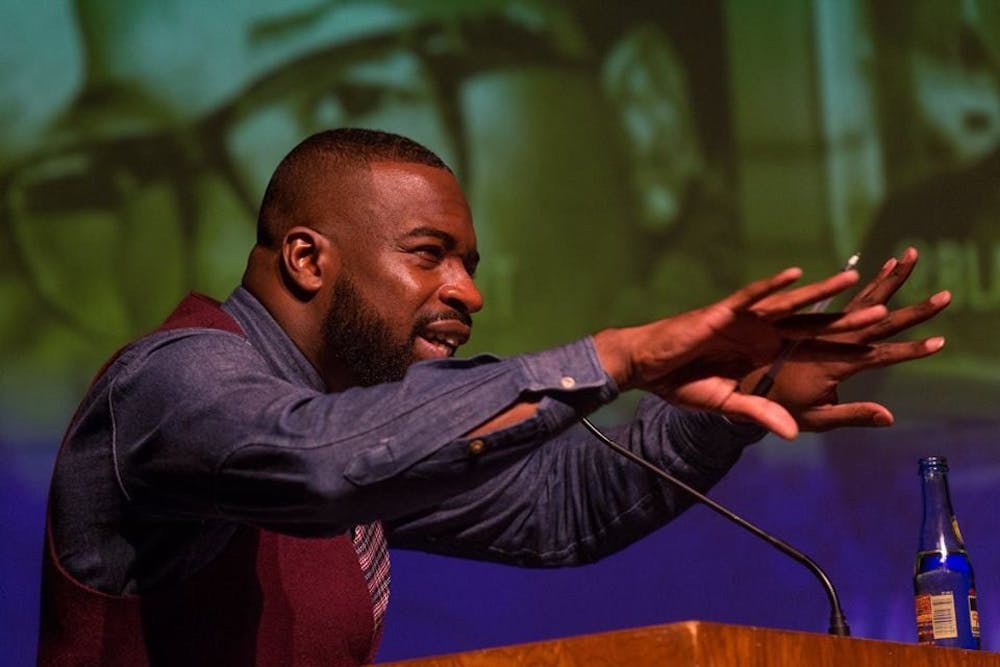BLMHTX: Students, faculty organize panel to discuss local, national inequity

What is citizenship? Rice students and professors sought to define this idea and discussed the state of citizenship in marginalized communities as part of a panel held by Houston’s chapter of Black Lives Matter. The event, which took place in Hamman Hall on April 7, also featured work from local artists.
Wiess College senior Blaque Robison and Martel College senior Chavonte Wright were part of the coordinating team for the event and presented on the panel as well. Robinson and Wright, who founded the Activism Initiative at Rice, are planning their own all-day conference, Channeling Passion into Action, for April 16.
“Our preparation [for the panel] was our activism and the way we go about learning about issues in social justice, how we experience these issues in social justice and what unique perspectives we offer as students,” Wright said.
Robinson said she hoped students would attend the event and expand not only their view of how African-Americans are denied the right to complete citizenship, but also their perspective on black students at Rice.
“I want Rice students to see more black people on campus that are thinking and doing great things,” Robinson said. “One thing that you don’t see a lot on campus is this gathering of prominent black thinkers, community members on our campus that are talking about this important issue.”
Lovie Olivia, an interdisciplinary artist in Houston, spoke as a panelist and created three-dimensional pieces focused around negative space for the event. Olivia said she hoped the event could show the community that the BLM movement is not simply black people discussing the issues black people face.
“[BLM] is about being a national society,” Olivia said. “To tune in on disadvantaged groups and pay attention to their needs.”
The panelists discussed citizenship from several different standpoints, including in a general sense, from an African-American perspective and in the case of intersectionality with the LGBTQ and black communities.
On the panel, humanities professor Anthony Pinn said he defined citizenship through place, privilege and practice.
“Place: birth, naturalized, this is your piece of earth,” Pinn said. “Privilege: there are opportunities that are publicly recognized that belong to you, [such as] voting, holding office, pursuit of happiness. And then practice: legal obligation but also legal protection.”
Associate English professor Nicole Waligora-Davis referenced a 1901 Supreme Court case on Puerto Rico declaring Puerto Rican citizens “foreign in a domestic sense” as an analogy to black citizenship today.
The panelists also noted the LGBTQ community could face similar issues with citizenship, and Wright said it was important to consider the intersectionality that occurs for African-Americans who identify as LGBTQ.
“In what ways are we building communities, but still marginalizing the LGBTQ community?” Wright said. “Does [the community you’re building] look like one that you would not or could not be a part of?”
Moderator Darnell Moore, a senior editor at the media company Mic, asked the panel about the Southlawn injunction proposal in south Houston. The proposal would prevent 92 men identified as gang members by the county from entering a 2-mile radius area. County officials say the injunction is a safety measure, but opponents question the ban’s constitutionality and the process by which the men were identified. The area is 78 percent black and 20 percent Hispanic.
Robinson said the injunction is an example of the limiting of citizenship in black communities.
“The criminal justice system is not just in the courthouse,” Robinson said. “It is in these safety zones, it’s in our neighborhoods. By the creation of these safety zones, black people cannot enter into their own community. You don’t get to move freely like a citizen can move freely.”
Pinn said he has tried to bring issues in the Houston community to Rice by challenging the boundaries of campus as the founding director of the Center for Engaged Research and Collaborative Learning. He also encouraged students to take courses from professors of color, attend events they hold and nominate them for awards to ensure their success.
Robinson said it was important to increase the visibility, voices and spaces for black students on Rice’s campus.
“A lot of times, black students on college campuses, we feel like we don’t belong,” Robinson said. “The project of a predominantly white institution was to never have us there in the first place, so by being there, we’re automatically disrupting something.”
More from The Rice Thresher

Andrew Thomas Huang puts visuals and identity to song
Houston is welcoming the Grammy-nominated figure behind the music videos of Björk and FKA twigs on June 27.

Live it up this summer with these Houston shows
Staying in Houston this summer and wondering how to make the most of your time? Fortunately, you're in luck, there's no shortage of amazing shows and performances happening around the city. From live music to ballet and everything in between, here are some events coming up this month and next!

Rice to support Harvard in lawsuit against research funding freeze
Rice, alongside 17 other research universities, filed an amicus curiae brief in support of Harvard University’s lawsuit against the Trump administration over more than $2 billion in frozen research grants.

Please note All comments are eligible for publication by The Rice Thresher.